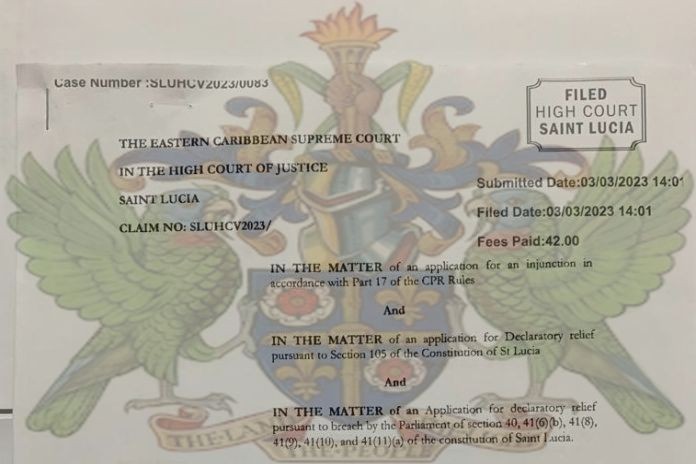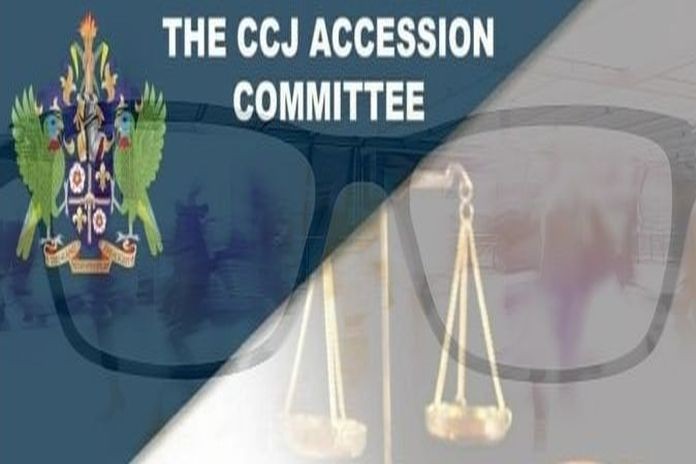By Caribbean News Global contributor
CASTRIES, St Lucia – Following the parliament of Saint Lucia Tuesday, February 28, the amendment to the Constitution of Saint Lucia “ Cap. 1.01 “the Act” to modify provisions that allow for appeals to Her Majesty in Council and to provide for appeals to the Caribbean Court of Justice,” an injunction was filed on Friday, March 3rd 2023, in the Eastern Caribbean Supreme Court in the High Court of Justice Saint Lucia, Claim No: SLUHCV2023/0083.
The affidavit of service and date served reads “attorney-general chambers, March 7, 2023, @1:01pm,” with the name and signature of the person who received/collected the document. Notable, parliament was in session on March 7, 2023, with the attorney-general in attendance.
The injunction registered multiple claimants and three defendants namely the speaker of the house, the president of the senate and the attorney-general of Saint Lucia, relates:
“In the matter of an application for an injunction according with Part 17 of the CPR rules” and “of an application for declaration relief pursuant to section 105 of the Constitution of Saint Lucia,” and “an application for declaratory relief pursuant to a breach by parliament of section 40,41(6)(b) 41(8) 41(9), 41 (10), and 41 (11) (a) of the constitution of Saint Lucia.”
At the February 28 sitting of parliament to amend the Constitution of Saint Lucia towards the accession of the Caribbean Court of Justice (CCJ), the amendment was secured by the 13 government members present in the 15-2 parliament. Of the 15 CARICOM countries, Saint Lucia is expected to become the fifth member country to make the CCJ its final court, joining Barbados, Belize, Guyana and Dominica.
At a September 15, 2022 press conference to launch the public information and education program to accede to the jurisdiction of the CCJ, as its final appellate court, the chair of the CCJ accession committee, Sir Dennis Byron, commented in part:
“The CCJ as it is known has two distinct jurisdictions. It has exclusive and compulsory authority in interpreting and applying the Revised Treaty of Chaguaramas. This means that it determines how the CARICOM Single Market and Economy (The CSME) functions. It provides stability and legal certainty through the uniform interpretation and application of the law relating to the CSME. Saint Lucia like the other member states of CARICOM has already acceded to this jurisdiction of the Court which we label as the court’s original jurisdiction. This term is applicable because the Court acts as the original or trial court and not as a court of appeal. […]
“The second jurisdiction the Court exercises is serving as final Court of appeal to replace the Privy Council as the court of last resort in civil and criminal matters.”
The Caribbean Court of Justice as [a] replacement to the Privy Council is incorporated into the Law of Saint Lucia.
“The Saint Lucia parliament passed the Caribbean Court of Justice (Agreement) Act 2003 to implement the agreement establishing the Caribbean Court of Justice. It prescribed that the Act would come into force on such day as the minister may appoint by Order in the Gazette, and that the minister may appoint different days for the coming into force of different parts of the Act.
Subsequently, Saint Lucia parliament passed the Caribbean Court of Justice (Agreement) (Amendment) Act 2005 to incorporate into the legislation the “Protocol to the Agreement Establishing the Caribbean Court of Justice Relating to the Juridical Personality and Legal Capacity of the Court”, as its second schedule; the “Protocol on the Status, Privileges and Immunities of the Caribbean Court of Justice and the Regional Judicial and Legal Services Commission”, as its third schedule, and the “Revised Agreement Establishing the Caribbean Court of Justice Trust Fund” as its fourth Schedule.
Part III the Act establishing the Court provided that the Court shall hear appeals from the Eastern Caribbean Court of Appeal and set out the details of the Court’s jurisdiction in that regard.
“Appeals to the Privy Council are abolished in section 27 of the Act which repealed the Saint Lucia Appeals to the Privy Council Order No 224 of 1967 to the extent that it has effect as law in Saint Lucia. It also provided that this repeal would not affect any proceedings pending before the Judicial Committee of the Privy Council immediately before the commencement of the Act.”
The need for constitutional change
“The Constitution of Saint Lucia in its current form contains section 108 entitled Appeals to Her Majesty in Council. This provides that appeals lie from decisions of the Court of Appeal to Her Majesty in Council. However, section 41 of the Constitution provides that Parliament may alter any of the provisions of the Constitution in the manner it specified. By virtue of section 41(2) a Bill to alter section 108 of the Constitution shall not be regarded as being passed by the House unless on its final reading in the House the bill is supported by the votes of not less than ¾ of all members of the House.
Section 41(6)(a) makes specifications as to time. It prescribes that a bill to alter any of the provisions of the Constitution shall not be submitted to the Governor General for assent unless there has been an interval of 90 days between the introduction of the bill in the House and the beginning of the proceedings in the House on the second reading of the bill.
Section 41(6)(b) prescribes that if the bill for the alteration of provisions of the Constitution including section 108 shall not be submitted to the Governor General for assent unless after it has been passed by the Senate and the House, it has been approved on a referendum. But the Constitution provides for an exception to that provision. Section 41(7)(a) as explained in the Court of Appeal Opinion in the Matter of The Attorney General’s Reference on Constitutional Questions in case Number SLUHCVAP 2012/0018 delivered on the 24th of May 2013 prescribes that the provisions of 41(6)(b) shall not apply in relation to any bill to alter section 108 in order to give effect to any agreement between Saint Lucia and the United Kingdom concerning appeals from any court having jurisdiction in Saint Lucia to Her Majesty in Council.
“To place this provision into context it should be noted that Saint Lucia Appeals to the Privy Council Order No 224 of 1967 was made in the United Kingdom pursuant to the Judicial Committee Act 1844. The agreement referenced in section 41(7)(a) refers to an agreement in which the UK agrees to the revocation of that Order and the replacement of appeals to the Judicial Committee by the Caribbean Court of Justice.” [ …]
Next steps
According to an update on March 4, 2023, from the public information and education program of the CCJ committee:
“The series continues in Gros Islet on Saturday, 11 March, at the Human Resource Centre, and then to Castries City Hall on Saturday 25 March.
“The committee has made and will intensify efforts to get the public informed and engaged in this journey of accession to the CCJ. This phase of the public communication programme will take us up to March 31, 2023, by which point we will reflect and evaluate to determine, largely on public engagement and feedback, how we proceed further.”
Meanwhile, the interpretation of law, Saint Lucia’s accession to the CCJ and sovereignty remains the battlefield.






